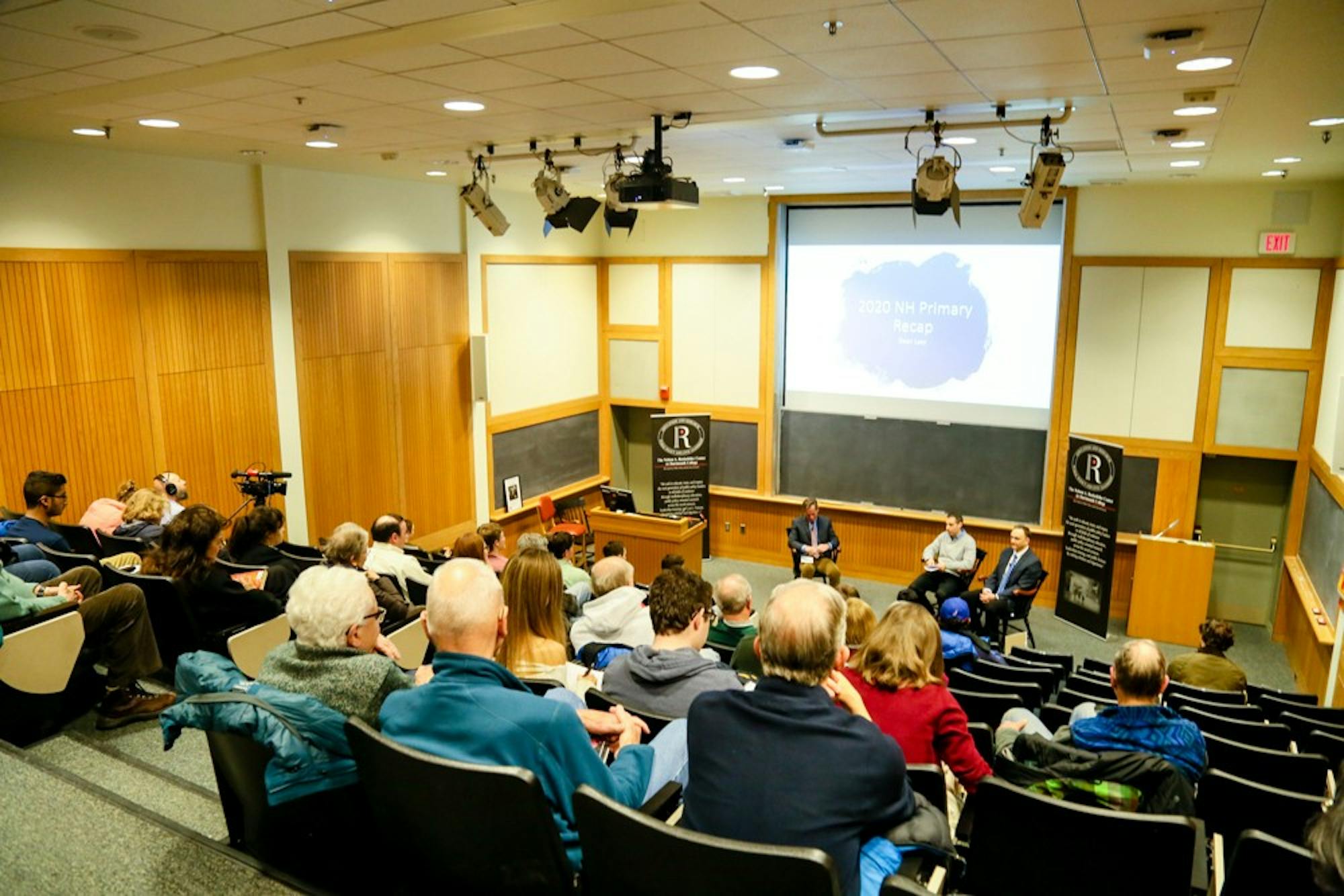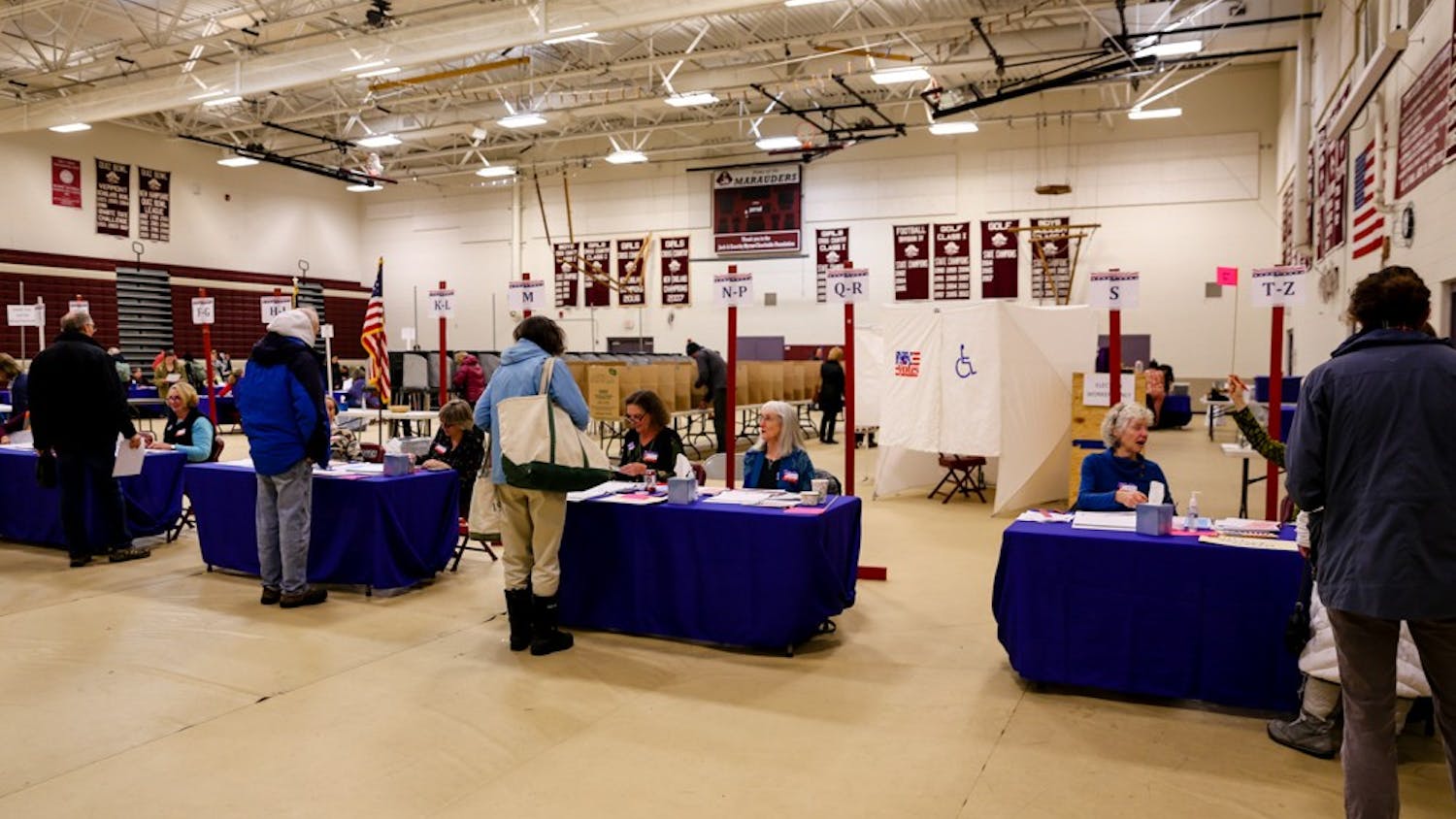The votes have been counted, the student canvasser tables at Novack Cafe are empty and the 2020 New Hampshire primary election has passed. But what exactly should community members make of the results?
That question was on the table at the Rockefeller Center for Public Policy and the Social Sciences on Thursday evening during a panel presentation titled “The 2020 NH Presidential Primary Election: A Political Postmortem Discussion.” The panelists included government professors Joseph Bafumi and Dean Lacy, and Rockefeller Center assistant director Ronald Shaiko moderated the event. Government professor Mia Costa was slated to appear on the panel but was sick and could not attend.
Last Tuesday’s primary saw Sen. Bernie Sanders (I-VT) win New Hampshire’s Democratic presidential primary with 25.7 percent of the vote, with former South Bend, IN mayor Pete Buttigieg coming in second place with 24.4 percent of the vote. President Donald Trump handily won the Republican presidential primary, with 85.6 percent of the vote.
The panelists drew attention to Sanders’ success in New Hampshire, with Bafumi saying that Sanders was the frontrunner in his opinion, as he won the popular vote in both Iowa and New Hampshire. Bafumi said that Sanders’ chances were good to win in the general election “if he can bring in new people to vote who typically don’t vote.”
Lacy mentioned the preliminary results of a survey he and a student is currently administering to demonstrate Sanders’ electability. While the survey only garnered 302 responses when he last checked it, Lacy said that 85 percent of people who voted for Trump in 2016 planned to vote for him today, with their votes mainly going to Democrats including Sanders and Warren. He also noted that 40 percent of the 32 people who voted for a third-party candidate in 2016 planned to vote for Sanders, and none of them planned to vote for Trump.
“I’ll tell you what the punchline is: Bernie Sanders can make a case for being electable,” Lacy said.
The panelists also discussed Sen. Elizabeth Warren (D-MA), who came in fourth place in New Hampshire behind Sanders, Buttigieg and Sen. Amy Klobuchar (D-MN) with 9.2 percent of the vote. Bafumi attributed this drop in support to Sanders’ success.
“These two candidates have been vying for many of the same sets of voters — people on farther to the left of the Democratic party — and Sanders so far has won that contest,” Bafumi said.
However, Lacy noted that he was not surprised by Warren’s poor performance. Despite Warren coming from the neighboring state of Massachusetts, Lacy said the media from Massachusetts that actually reaches New Hampshire is much more moderate. He added that had almost a Sanders’ “home-state advantage” in New Hampshire, especially along the border with Vermont, which Warren needed to capture in order to do well.
“She’s got to avoid being labeled as the disappointment,” Lacy said.
Bafumi also mentioned former vice president Joe Biden’s gradual decline. Bafumi compared Biden, who finished fifth in New Hampshire with 8.4 percent of the vote, to former Florida governor Jeb Bush, who notably coasted with name recognition frontrunner status before dropping out of the Republican primary race in 2016.
Klobuchar, who came in third place in New Hampshire with 19.8 percent of the vote, is “now among the top tier of candidates,” according to Bafumi, mentioning her strong debate performance in Manchester days before the primary. Lacy called attention to her growing success, which he felt she already deserved due to her effectiveness as a legislator.
“She was a formidable candidate from the beginning,” Lacy remarked, commenting on her strength in conservative districts. “Iowa didn’t see it; New Hampshire validated it and put Amy Klobuchar where I think she probably should have been.”
New Hampshire’s high number of swing voters and experience with regional politics helped Klobuchar get more support than she might have if other states such as South Carolina or Nevada had gone first, Lacy said.
Both panelists also spoke on Buttigieg’s rising position after the Iowa caucuses. Bafumi explained that before the Iowa caucuses, Buttigieg’s support was dropping or, at best, staying the same. He said that one of the possible explanations for this new success was that Buttigieg picked up support from people who supported other candidates, namely Andrew Yang, but did not meet the 15 percent threshold for any delegates to be assigned. This success, Bafumi said, could have given him momentum when going into the New Hampshire primary.
Lacy also mentioned Buttigieg’s diverse ideological backing. He called attention to a graphic from the website FiveThirtyEight showing the distribution of votes in New Hampshire for each candidate, divided into very liberal, somewhat liberal, moderate and conservative voter ideologies.
“Pete Buttigieg is drawing across the ideological spectrum. Amy Klobuchar is moderate to right,” Lacy said. “Bernie Sanders is picking up more [voters] from across the ideological spectrum than I expected.”
Bafumi said that former New York City mayor Michael Bloomberg, who did not appear on the New Hampshire or Iowa ballots, is a “wild card candidate.”
“Bloomberg got in because he saw, I think, he saw that there’s potential for a centrist candidate who’s very electable,” Bafumi said. He compared him to Klobuchar, guessing that Klobuchar or Bloomberg would probably be the centrist candidate in the election that would appeal to voters skeptical of Sanders.
The primary lead to three candidates suspending their campaigns — Yang and Sen. Michael Bennet (D-CO) on Tuesday, and former Massachusetts Senator Deval Patrick on Wednesday. Lacy argued for New Hampshire’s importance in hosting the first primary, calling attention to the state’s ability to “winnow out a lot of the inexperienced candidates,” naming Yang and Tom Steyer as candidates who had enthusiastic support and advertising money, respectively, but who did not receive much support in the primary.
Aside from the specific candidates, the panelists also took time to reflect on the intricacies of the primaries, with Lacy arguing that today’s larger parties have less explicit control over the candidate who wins the primary. He pointed to the 2016 Republican primary as an example, noting that Trump was an outlier.



